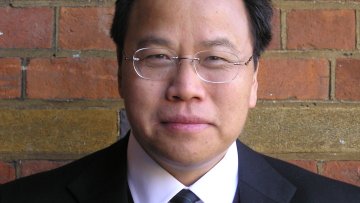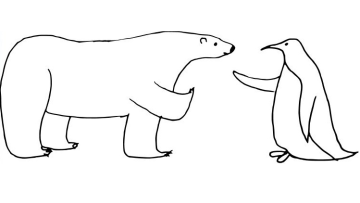Oxford Mathematician and Fellow of Keble College, Gui-Qiang G. Chen has been elected a Fellow of the American Mathematical Society in recognition of his contribution to partial differential equations, nonlinear analysis, fluid mechanics, hyperbolic conservation laws, and shock wave theory.
11:00
10:00
Realising the projective representations of the symmetric group using Dirac cohomology.
Abstract
Firstly I will outline Dirac cohomology for graded Hecke algebras and the branching rules for the projective representations of $S_n$. Combining these notions with the Jucys-Murphy elements for $\tilde{S}_n$, that is the double cover of the symmetric group, I will go through a method to completely describe the spectrum data for the Jucys-Murphy elements for $\tilde{S}_n$. If time allows I will also explain how this spectrum data gives rise to a a concrete description for the matrices of the action of $\tilde{S}_n$.
11:30
Group theory in chemistry
Abstract
I will try to give a brief description of the use of group theory and character theory in chemistry, specifically vibrational spectroscopy. Defining the group associated to a molecule, how one would construct a representation corresponding to such a molecule and the character table associated to this. Then, time permitting, I will go in to the deconstruction of the data from spectroscopy; finding such a group and hence molecule structure.
11:30
Hilbert's Third Problem
Abstract
Two polyhedra are said to be scissors congruent if they can be subdivided into the same finite number of polyhedra such that each piece in the first polyhedron is congruent to one in the second. In 1900, Hilbert asked if there exist tetrahedra of the same volume which are not scissors congruent. I will give a history of this problem and its proofs, including an incorrect 'proof' by Bricard from 1896 which was only rectified in 2007.
11:30
Methods of Galois group computation
Abstract
The problem of computing the Galois group of an irreducible, rational polynomial has been studied for many years. I will discuss the methods developed over the years to approach this problem, and give some examples of them in practice. These methods mainly involve constructing and factorising resolvent polynomials, and thereby determining better upper bounds for the conjugacy class of the Galois group within the symmetric group, i.e. describe its action on the roots of the polynomial explicitly. I will describe how using approximations to the zeros of the polynomial allows us to construct resolvents, and in particular, how using p-adic approximations can be advantageous over numerical approximations, and how this can yield a direct and systematic method of determining the Galois group.
Mathematics can look like a foreign language to those who have not studied it in depth. Even for mathematicians, it can be difficult to understand the work of colleagues in other branches of mathematics, or indeed to know what questions they are seeking to answer in their research, because the vocabularies are so specialised and technical.
14:15
Asymptotic behaviour for equidispersive solutions of the Boltzmann equation
Abstract
In this talk we consider particular solutions of the Boltzmann equation which have the form $f (x,v,t) = g (v − M (t)x,t)$ where $M (t) = A(I + tA)^{−1}$ with the matrix $A$ describing a shear flow or a dilatation or a combination of both. These solutions are known as equidispersive solutions. We will show that, for different choices for the matrix A and for different homogeneities of the collision kernel, we obtain different long time asymptotics for the corresponding equidispersive solutions. In particular we will focus on the case of simple shear flow and prove rigorously the existence of self-similar solutions with exponentially increasing internal energy.



